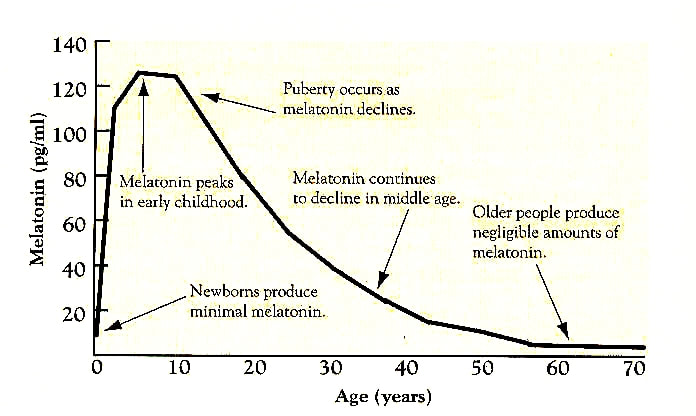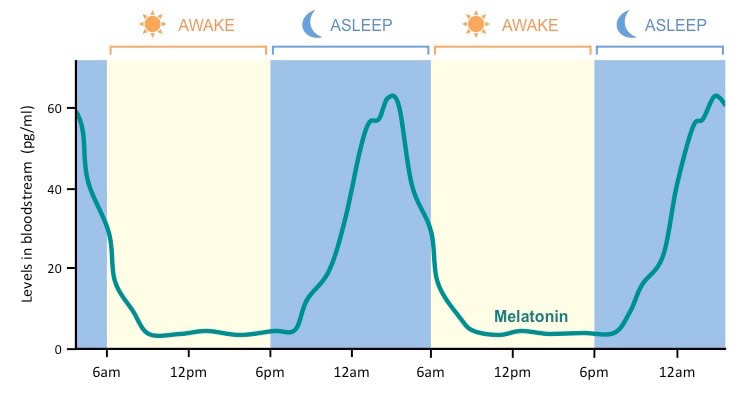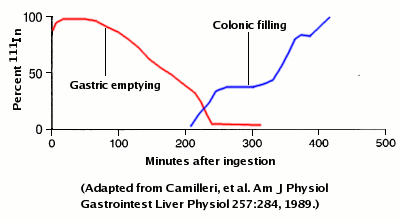|
SEARCH My Blog (Opens in new tab)
Why was I sleeping better? What I found surprised meAs we get older, our production of melatonin significantly decreases. This decrease does not just affect sleep quality, as melatonin is a hormone with a range of other vital functions. It's possible this decline in melatonin production could be offset by dietary melatonin, i.e. eating foods with a high melatonin content. Recently I noticed that I was sleeping better, and what I found when I investigated it surprised me. Melatonin does a lot more than just regulate good sleepWe mostly think of melatonin as just something that regulates our body's biological cycle. It is a circulating neurohormone secreted predominantly at night. It is vital in conveying the daily cycle of light and darkness to the body, thus regulating circadian rhythms and helping us to fall asleep and to sleep deeply. But melatonin does a lot more than regulate our sleep. It also acts as an essential brain antioxidant, it helps to prevent the build-up of amyloid plaque linked to Alzheimer's disease (related to its ability to cross the blood–brain barrier), it supports immune system function, and it has some direct anti-cancer effects on breast and prostate tissues. Experimental evidence also demonstrates that melatonin is necessary for the proper synthesis, secretion, and action of insulin. When melatonin levels are low insulin secretion is low. This low level means that, in older people, their late-evening blood sugar is poorly regulated - because of the lack of insulin. A consequence of poor blood sugar regulation is an accumulation of body fat. One of the reasons that people tend to gain weight (body fat) as they get older (even though they are not eating more calories) is associated with this age-related decline in melatonin secretion. Our melatonin level drops by 91% as we ageOur level of melatonin production drops hugely during our lifetime. This is because our pineal gland degenerates with aging. For example, compared to age 3, by age 70 our melatonin levels have dropped by 91%. Low levels of melatonin not only lead to inferior sleep quality but also potentially exacerbate a host of age-related diseases. That's because melatonin improves mitochondrial function, and has antioxidant effects, acting as a free radical scavenger and boosting antioxidant enzymes. Consequently, melatonin deficiency might cause an acceleration of aging and increase the likelihood of developing age-related diseases. This decline can be countered to a small degree by a timed exposure to daylight. Timed daylight, and the right food can helpThe pineal gland - which is located deep within our brain - is the source of melatonin. Our hypothalamus integrates information from our eyes with the neurological expression of our circadian rhythm. The hypothalamus then signals the pineal gland to release melatonin to optimise the quality of our sleep and energy balance. In one study (2016), older people who rarely went outside were asked to just sit in the sunlight for 30 minutes between 9 am and 10 am, and between 4 pm and 5 pm. Their overnight melatonin levels (measured at 7 am) shot up by 140%. The night sleep quality and daytime alertness of all participants improved. Their self-reported levels of anxiety and insomnia dropped by 33%. This type of experiment illustrates how our eyes, brain and circadian rhythm modulate the flow of melatonin and its beneficial outcomes for older people. Food can also raise our melatoninIn addition to timed exposure to daylight, food offers another way to increase our levels of melatonin. Dietary melatonin is a bioactive phytochemical, similar to polyphenols (and a well-established component of the traditional Mediterranean diet). Thus, given that dietary melatonin is absorbed in the gastrointestinal tract and transported into the bloodstream, foods as a source of melatonin could be useful in helping melatonin modulation and, consequently, in maintaining better health for longer. Collectively, melatonin is in lots of foods. In animal foods, eggs and fish are relatively abundant in melatonin. Mushrooms are also high-melatonin foods, and some cereals and germinated legumes or seeds also have high melatonin. However, nuts contain the highest melatonin content. Tree nuts are rich in bioactive phytochemicals. Their regular, moderate consumption is associated with a reduced risk of chronic-degenerative diseases, in the context of a healthy diet and lifestyle. For example, consumption of walnuts can help manage weight loss, and pistachios contain useful quantities of anthocyanins. Anthocyanins are known for their capacity to lower blood pressure, improve visual acuity, reduce cancer cell proliferation, inhibit tumour formation, prevent diabetes, lower the risk of CVD and to improve cognitive fitness. How many pistachios for better sleep?Here's what I discovered recently - pistachios are rich in melatonin! Pistachios are among the richest of all foods in melatonin, and, for example (comparing dry weights):
To my surprise I also found that snacking pistachios better helps you better manage weight loss! Timed eating to boost night-time levelsEating high-melatonin foods will raise our general level of melatonin, but timed eating may be more beneficial in increasing the melatonin at the right time i.e. the late evening. But how to work out the timing? There are two key considerations, (1) our natural melatonin cycle, and (2) the digestive cycle. Our natural melatonin cycle peaks at around 1am to 2am, then drops to the lowest level around 10am and stays low until around 7pm. Therefore, we want the peak of dietary melatonin circulating in our blood to reinforce the usual cyclical peak at about 2am. We have to time our consumption to match our gastrointestinal transit, which has the following timing:
When melatonin is taken as a supplement, or from drinking red wine, its effect can be measured in the blood within one hour. Nuts take longer to digest, and probably have most nutrients extracted in the small intestine. Therefore, eating pistachios between 6 pm and 9pm may produce a timed spike in melatonin levels consistent with the night-time peak. This timing is something that requires experimentation, as our digestive microflora and behaviours are all different. A little trial and error, around 8pm works best for meHere's what I suggest:
I found that around 8 pm seems to work for me. How much to eat? About 50 pistachio nuts contain a useful quantity of nutrients, without too many calories (about 150). You might wonder if processing significantly alters the nutritional benefits? Apparently not. This study found that dry roasting and lightly salting nuts did "not appear to negate the cardioprotective effects observed with raw nut consumption". A caveat - this can’t make up for a bad dietHere's a caveat. While diet and nutrients modulate fluctuating melatonin levels, the influence is minor when compared with the power of the light-dark cycle. Other health-related lifestyle factors, such as being overweight, can also negate potential dietary benefits. In general, the best lifestyle solution is to have a diet rich in vegetables, fruits and grain products and to get a nice dose of sunshine daily. That said, I have noticed a difference in my sleep - for the better - when I eat 50 or so pistachio nuts each evening. It was this difference that prompted me to see if there could be any relationship between the two. This post is what I discovered. It might also work for you. > More posts to help you with EXERCISES > More posts to help you with DIABETES > If you are a @MEDIUM reader my publication Body Age Buster has hundreds of categorised posts which I have written especially for men and women over 50 Follow me on Quora for more health and fitness tips.
If you valued this article >> Follow me Leave a comment >> Share it >> Stay healthy If you have any questions email me and I will get back to you. Latest: get your free customised fitness plan designed uniquely for you.
|
ChoicesSince I was diagnosed at 50 with Type 2 diabetes I've been learning how to do bone-building fitness training which lowers my age. You can too. It's your choice. Walter Categories
All
Archives
May 2023
|




 RSS Feed
RSS Feed 


